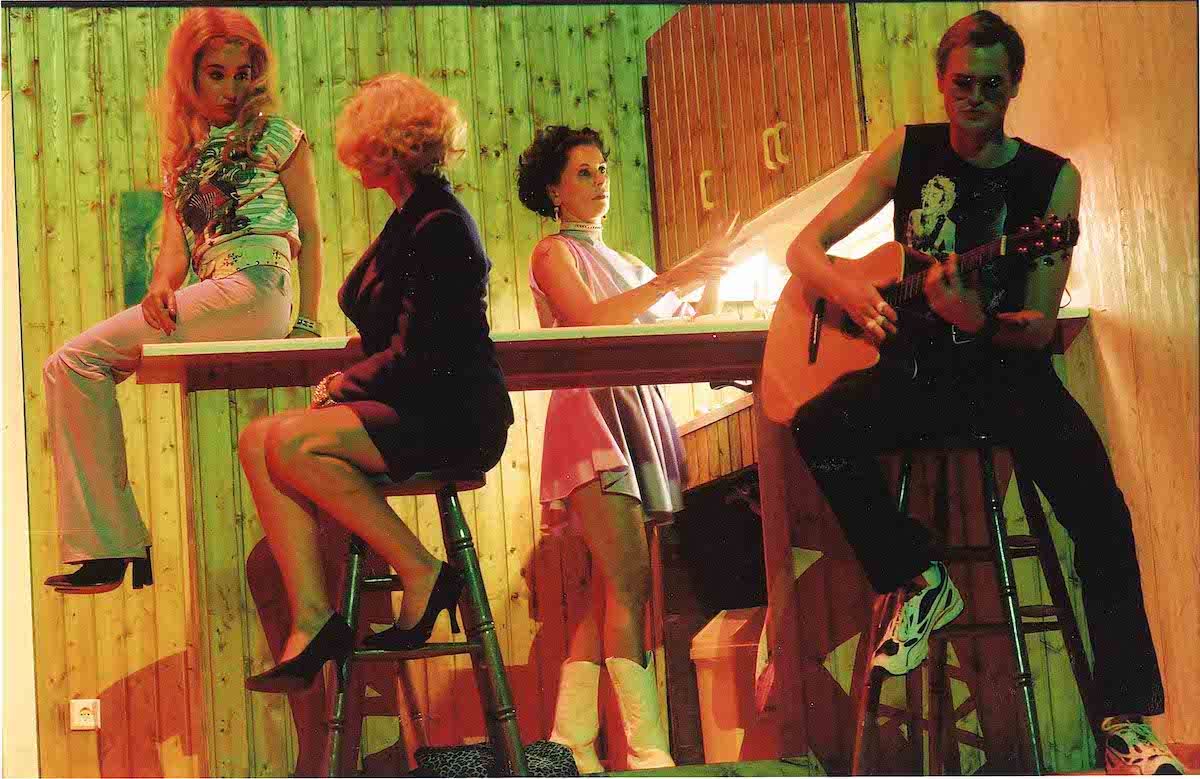
Towards the end of the performance the stage floor suddenly tilts by about 30 degrees. Everything that is standing on stage, - chairs, cutlery, boxes, bottles, kitchen equipment - falls. The ground is shifting. From this moment on the actors have to literally find their balance in a world that is breaking apart. Sitting in the audience the question looming in the back of one's mind is this: will the stage tilt further?
In the final scene, little by little, the front of the scene moves further upwards until an angle of about 60 degrees. The actors now lie on the floor, crawling on top of each other as they try to hold on to the stage frame. Occasionally, one of them loses the battle against gravity and his fellow actors and tumbles backwards. The scene is at once hilarious and dramatic, bringing back memories of sinking ships in movies such as Titanic. But in Endstation Amerika it is the ship that is one's life that is capsizing and sinking.
The estate of Tennessee Williams was less impressed and demanded that the production not be called A Streetcar Named Desire. And so it now goes by the title of "Endstation Amerika. Eine Bearbeitung von Frank Castorf von Endstation Sehnsucht. A Streetcar Named Desire von Tennessee Williams" or Endstation Amerika for short.
It is not too hard to see why someone used to naturalist productions, faithful to the original text, might frown at Frank Castorf's adaptation. For one thing, Castorf has done away with some of the additional characters and focuses on Stanley and Stella Kowalski, Blanche Dubois, Stanley's poker friends Harold "Mitch" Mitchell and Steve Hubbel and his wife Eunice. Yet, having seen two other versions of A Streetcar Named Desire, Castorf's Endstation Amerika is by far the most compelling and makes other adaptations look a bit tame by comparison.
In Castorf's adaptation Stanley Kowalski is a Polish immigrant who used to stand on the barricades alongside Lech Walesa. Those were the days. He now earns a living handing people chewing gum samples on the street. He makes some extra money with the illegal export of liquor. In one scene Blanche compares him to a gorilla. A moment later Stanley enters in a gorilla costume. It is his working outfit. This scene perfectly illustrates Stanley Kowalski's personal tragedy and the subtle layers Frank Castorf has added to the piece.
The stage design is as simple as it is effective, underlining the misery of the Kowalski's life as immigrants in a foreign country. We see an apartment. To the right is a kitchen with a bar, to the left is a double bed and that's about it. The wallpaper looks dreary, cheap. Next to the bed is a door, which leads to the bathroom. A television shows what's going on inside the bathroom.
In the scene in which Stella has her first contractions, Stanley has Steve take the camera from the bathroom and point it at Stella, who is lying on the bed. This has the double effect of revealing the mechanisms of the piece and of adding a stage prop that can be incorporated as such in subsequent scenes. While this can be traced back to Bertold Brecht's concept and use of the Verfremdungseffekt, which aimed to remind the audience of the artificiality of theatrical performance, by also using the camera as a stage prop Castorf adds another layer of meaning.
The opening scene is pure poetry. A man, Steve Hubbel, sits at the kitchen bar striking some chords on his guitar while singing Lou Reed's A Perfect Day. Behind him in the kitchen two women, Stella and Eunice, are breaking eggs. In tune with the music one of them lets out an "ow", while the other follows with a "ploop". This goes on for several minutes until Stanley gets home. It is hilarious and somehow also deeply moving. If you are familiar with the play, you know that this is not going to be a perfect day (of course, the song lyrics are profoundly ironic as well).
Somehow it all fits together: the stage design, the piece, the music, the acting, this is why I go to see a theatre performance.
The actors are outstanding. Kathrin Angerer plays yet another magnificent role as Stella. She can scream, whine, yell and moan like no other.
All Volksbuehne actors are good at improvising. When Blanche arrives she puts her two suitcases in the middle of the living room. A few scenes later in a burst of rage Stanley throws them away, but during the performance I attended one of the suitcases flew into the audience. In a subsequent scene Stanley searches for some letters among Blanche's belongings. "Where's the other suitcase?", he asks looking around. There's some tension in the audience, now what? "Ohh I see", he says, "it fell out of the house". Laughter as he jumps into the audience, gets the suitcase, climbs onto stage again and continues where he left off. And best of all, it seemed perfectly natural. "Keep it", I would have said, if it had happened during the rehearsals, then again, for all that I know, maybe it did.
Links
My review of Der Meister und Margarita by Frank Castorf.
My review of Forever Young by Frank Castorf.
My review of Erniedrigte und Beleidigte by Frank Castorf.